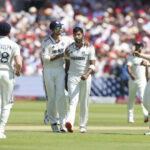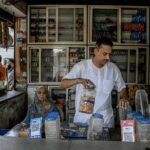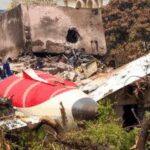Peru’s former president Alberto Fujimori, a divisive leader who tamed hyperinflation and a Maoist insurgency but was later jailed for corruption and human rights abuses, has died aged 86.
Little-known when he won office, Fujimori led the Andean nation for a decade from 1990, introducing free-market reforms which made Peru for a time one of Latin America’s fastest-growing economies.
But his authoritarian tactics, which included deploying army tanks to shut down Congress and rewrite the constitution, eventually proved his undoing. In 2009, he was convicted of multiple crimes and given a 25-year sentence.
“After a long battle with cancer, our father Alberto Fujimori has just met the Lord,” his daughter Keiko Fujimori, also a prominent conservative politician, wrote on X, in a message also signed by his three other children. “We ask those who appreciated him that they accompany us in praying for his soul’s eternal rest.”
Fujimori had been released from prison in December last year on humanitarian grounds because of his ailing health, leaving jail on the outskirts of the capital Lima in an oxygen mask. Despite his frailty, he continued to flirt with the idea of running again for president in Peru’s 2026 election.
Alberto Kenya Fujimori, nicknamed el Chino (the Chinaman) for most of his life because of his Asian heritage, was a little-known agricultural engineer when he defeated acclaimed author Mario Vargas Llosa to win the presidency. His family’s origins made him popular among Peru’s peasant masses, descendants of Inca tribes, who felt marginalised by the country’s white elite which traced their roots to Europe.
He faced two pressing challenges: a dire economic emergency and an insurgency by the Maoist Sendero Luminoso (Shining Path) guerrillas, who controlled up to a third of the country. Output had contracted by about a quarter from 1987 to 1990, while inflation spiralled to 7,500 per cent.
The new president’s solution was what became known as the “Fuji-shock”: a free-market programme slashing trade tariffs, cutting government subsidies, introducing a new currency and privatising a host of ailing state-run companies. These measures helped to lay the foundations for two decades of growth well above the Latin American average.
But in 1992, citing the need for no-holds-barred policies and backed by the military, Fujimori dissolved Congress and suspended the constitution, taking on dictatorial powers. The following year, he and his supporters drafted a new constitution, increasing presidential power and reducing congress to a single chamber.
When the founder and leader of Sendero Luminoso, Abimael Guzmán, was captured in September 1992 along with other guerrilla leaders, Fujimori paraded the rebel chief in prison pinstripes, pacing like a lion inside a cage surrounded by hooded guards. Peruvians celebrated the demise of a group which briefly had seemed on the verge of toppling the state.
In 1995, under international pressure to restore democracy, Fujimori reinstated Congress but he had already rewritten the constitution to allow himself to run again for president. His successes against the guerrillas and hyperinflation saw him swept to power by a historic margin, defeating former UN secretary-general Javier Pérez de Cuéllar.
Fujimori’s estranged wife Susana Higuchi attempted to run against him for president that year while both lived in the presidential palace, but her candidacy fell through and they were later divorced. Their daughter, Keiko, then only 19 years old, subsequently acted as his first lady — a prelude to her own political career, including three unsuccessful runs for president.
During his second term, Fujimori burnished his strongman credentials by ordering a military assault on the Japanese embassy in Lima in 1997 to end a four-month siege by Marxist Tupac Amaru guerrillas, who were holding dozens of hostages. All 14 rebels were killed and all bar one of the 72 captives were safely rescued.
In the run-up to the 2000 presidential election, Fujimori suddenly announced he would run again for re-election. His opponents pointed out that a third term was illegal. But he argued that, since he had rewritten the constitution in 1993, he had actually run only once under the existing constitution. He was re-elected amid widespread reports of ballot-rigging, but it was becoming increasingly clear that he was pushing his luck.

The key to Fujimori’s downfall was his closeness to shadowy intelligence chief Vladimiro Montesinos. In September 2000, a videotape surfaced showing Montesinos bribing an opposition congressman with $15,000 to support Fujimori. Hundreds more videotapes emerged, all recorded by the intelligence chief himself to keep track of his bribes. Montesinos has been in jail since 2001 on human rights abuse and corruption charges.
Seeing the writing on the wall, Fujimori, while on a visit to Brunei, fled to Japan in November 2000 and was granted citizenship because of his parentage. He resigned the Peruvian presidency by fax, but Peru’s Congress ruled that he had shown “moral incapacity” and called for his extradition. It said there was evidence he had full knowledge of death squads attached to Montesinos and his intelligence service.
Japan refused to extradite him and allowed him to live in exile in Tokyo.
Fujimori claimed he was innocent, blaming Montesinos, and always said he had hoped to return to Peru “in an active role”. Instead, he was arrested in 2005 while visiting Chile and extradited to Peru, where in a series of trials he was eventually convicted of ordering military death squad killings, funnelling millions of dollars of state money to Montesinos and illegal wiretapping.

Fujimori thus became the first democratically elected head of state to be extradited, tried and sentenced in his own country to jail. At the time of his death he was facing several other criminal investigations, including over paramilitary killings and the forced sterilisation of women during his government.
To his supporters, he remained a hero who saved his country from economic disaster and Marxist insurgency; to his opponents, a corrupt dictator with blood on his hands who weakened political parties and the independence of the judiciary. Both sides of his legacy endure in Peru today.
“Even his funeral will divide the country,” said Gonzalo Banda, a Peruvian political scientist and columnist. “He was a dictator who committed several serious crimes and never repented for any of them, but he is also responsible for liberal reforms, macroeconomic stability, and a modern constitutional order that changed the relationship between its citizens and the state forever.”





